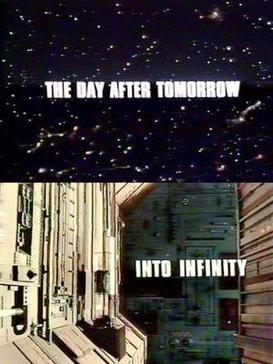
Science fiction first appeared in television programming in the late 1930s, during what is called the Golden Age of Science Fiction. Special effects and other production techniques allow creators to present a living visual image of an imaginary world not limited by the constraints of reality.

The Mysterons are a fictional race of extraterrestrials and the antagonists in the 1960s British Supermarionation science-fiction television series Captain Scarlet and the Mysterons (1967–68) and its 2005 computer-animated remake, Gerry Anderson's New Captain Scarlet. They are the remnants of the original Mysteron race: alien beings that originated in a galaxy other than the Milky Way and maintained a colony on Mars. They are symbolised by ubiquitous, projected green rings of light and the deep bass voice of their human convert Captain Black.
Christopher Franklin Boucher was a British television screenwriter, script editor and novelist. He is known for his frequent contributions to two genres, science fiction and crime fiction, and worked on the series Doctor Who, Blake's 7, Shoestring, Bergerac, The Bill and Star Cops.

"Wormhole X-Treme!" is the 100th episode of military science fiction adventure television show Stargate SG-1 and is the 12th episode of the fifth season. The episode was first broadcast September 8, 2001 on Showtime in the United States. It was written by series co-creator and executive producer Brad Wright along with supervising producers Joseph Mallozzi and Paul Mullie and was directed by Peter DeLuise.
U.S. television science fiction is a popular genre of television in the United States that has produced many of the best-known and most popular science fiction shows in the world. Most famous of all, and one of the most influential science-fiction series in history, is the iconic Star Trek and its various spin-off shows, which comprise the Star Trek franchise. Other hugely influential programs have included the 1960s anthology series The Twilight Zone, the internationally successful The X-Files, and a wide variety of television movies and continuing series for more than half a century.

Star Cops is a British science fiction television drama series first broadcast on BBC2 in 1987. It was devised by Chris Boucher, a writer who had previously worked on the science fiction television series Doctor Who and Blake's 7 as well as crime dramas such as Juliet Bravo and Bergerac. Set in the year 2027, a time where Interplanetary travel has become commonplace, it starred David Calder as Nathan Spring, commander of the International Space Police Force—nicknamed the "Star Cops"—who provide law enforcement for the newly developing colonies of the Solar System. The series follows Nathan Spring and the rest of his multinational team as they work to establish the Star Cops and solve whatever crimes come their way. Operating in a relatively accurately realised hard SF, near-future, space environment, many of the cases that the Star Cops investigate arise from opportunities for new crimes presented by the technologically advanced future society the series depicts and from the hostile frontier nature of the environment that the Star Cops live in.

"Lost City" is the two-part finale to the seventh season of the science fiction television show Stargate SG-1. The episode was written by Brad Wright and Robert C. Cooper, with Martin Wood directing. The first part originally premiered on March 2, 2004, with the second part showing a week later on March 9, 2004 on Sky One in the United Kingdom. SciFi Channel in the United States then aired part one on March 12, 2004 and part two on March 19, 2004.

Starburst is a British science fiction magazine published by Starburst Magazine Limited. Starburst contains news, interviews, features, and reviews of genre material in various media, including TV, film, soundtracks, multimedia, books, and comics books. The magazine is published quarterly, with additional news and reviews being published daily on the website.
"Birthright" is the 10th episode from the seventh season military science fiction adventure television show Stargate SG-1. The 142nd episode overall, "Birthright" was first broadcast on the Sci-fi Channel in the United States on August 15, 2003. The episode was written by Christopher Judge, who is best known as the character Teal'c on the show. Peter Woeste directed the episode.
"Avenger 2.0" is the 9th episode from the seventh season of military science fiction adventure television show Stargate SG-1 and is the 141st overall. It was first broadcast on August 8, 2003, on the Sci-fi Channel. The episode was written by duo Joseph Mallozzi and Paul Mullie, and was directed by Martin Wood.
"Homecoming" is the 2nd episode of the seventh season of adventure military science fiction television series Stargate SG-1. The second part of a two-part episode, it was first broadcast on June 13, 2003, on the Sci-fi Channel, directly after the part 1, "Fallen". Writing duo Paul Mullie and Joseph Mallozzi wrote the episode, with Martin Wood directing. The episode is the 134th overall.
"Full Circle" is the season finale for season six of the Canadian-American military science fiction television series Stargate SG-1. It was originally intended to be the last episode of Stargate SG-1. The episode was written by executive producer Robert C. Cooper and directed by Martin Wood. The episodes received an average Nielsen household rating and a low syndication rating compared to other season six episodes. The episode got strong reviews from major media publishers worldwide.

The Day After Tomorrow is a 1975 British science-fiction television special produced by Gerry Anderson between the two series of Space: 1999. Written by Johnny Byrne and directed by Charles Crichton, it stars Brian Blessed, Joanna Dunham, Nick Tate, Katharine Levy and Martin Lev, with narration by Ed Bishop. Set in a future where environmental damage on Earth threatens the survival of humanity, The Day After Tomorrow follows the interstellar mission of Altares, a science vessel that uses photon energy to travel at the speed of light. After leaving the Solar System and reaching Alpha Centauri, their primary destination, the crew of Altares push deeper into space; there, they encounter phenomena including a meteor shower, a red giant and, finally, a black hole, which pulls the ship into another universe.
The Doctor Who Appreciation Society (DWAS) is a society for fans of the television series Doctor Who. It was founded in May 1976, emerging from the Westfield College Doctor Who Appreciation Society, and the editors and readers of the fanzine Tardis.

"Terror in New York City" is an episode of Thunderbirds, a British Supermarionation television series created by Gerry and Sylvia Anderson and filmed by their production company AP Films for ITC Entertainment. Written by Alan Fennell and directed by David Elliott and David Lane, it was first broadcast on 21 October 1965 on ATV Midlands as the fourth episode of Series One. In the official running order, it is the 13th episode. It had its first UK-wide network broadcast on 22 November 1991 on BBC2.
British television science fiction refers to popular programmes in the genre that have been produced by both the BBC and Britain's largest commercial channel, ITV. BBC's Doctor Who is listed in the Guinness World Records as the longest-running science fiction television show in the world as well as the "most successful" science fiction series of all time.
Tom Spilsbury is a British writer, magazine editor and journalist. As of 2021, he is a feature writer for TV Choice and Total TV Guide magazines. A former pupil of Bristol Cathedral School, he was, for ten years, editor of Doctor Who Magazine (DWM).

The Indian Telly Awards is an annual award for excellence both on-screen and behind-the-scenes of Hindi-language television. Conceptualised and created by Anil Wanvari, the founder, CEO of media and services group, indiantelevision.com, they are in their 12th edition currently. Wanvari is also on the board of the International Academy of Television Arts and Sciences, and has been a semi-final judging host for the awards since 2006. The awards for Indian television are given in several categories such as best programme or series in a specific genre, most popular actors and awards for technical roles such as writers and directors. The awards are currently managed by a division within indiantelevision.com called ITV2.0 Productions.

Kyrano is a fictional character featured in the 1960s British Supermarionation television series Thunderbirds and its 2004 live-action film adaptation.
William Smethurst was a British screenwriter and producer for television and radio. He has written television and radio scripts for series like The Archers and Crossroads.








